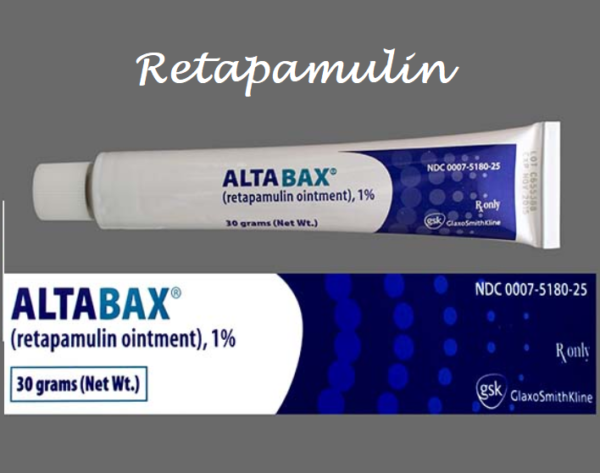Altabax (Retapamulin) is a bacteriostatic medicine that inhibits bacterial biosynthesis. It is used in the treatment of impetigo due to Staphylococcus aureus (methicillin-susceptible isolates only) or Streptococcus pyogenes in adults and pediatric patients 9 months and older.
Altabax (Retapamulin) dose in Adults
Altabax (Retapamulin) dose in the treatment of Impetigo:
- A thin layer is applied to the affected area twice daily for 5 days
- The total treatment area should not exceed 100 cm² total body surface area.
Altabax (Retapamulin) dose in Children
Altabax (Retapamulin) dose in the treatment of Impetigo:
- Total treatment area should not exceed 2% of total body surface area or 100 cm² total body surface area, whatever is less.
-
Infants 1 to <9 months:
- It is applied to lesions twice daily for 5 days
-
Infants ≥9 months, Children, and Adolescents:
- it is applied to the affected area (lesions) twice daily for 5 days
Pregnancy Risk Factor B
- Animal reproductive studies have not revealed any negative effects. Considering Breast-Feeding
Altabax (Retapamulin) use during breastfeeding:
- Retapamulin may or may not be excreted in breast milk.
- Retapamulin should not be administered to breastfeeding mothers, according to the manufacturer.
Altabax (Retapamulin) dose in renal disease:
- The labelling provided by the manufacturer does not mention dosage modifications.
- However, due to limited systemic absorption, dosage modification is improbable.
Altabax (Retapamulin) dose in liver disease:
- The labelling provided by the manufacturer does not mention dosage modifications.
- However, due to limited systemic absorption, dosage modification is improbable.
Less Common Side Effects of Altabax (Retapamulin) Include:
-
Central nervous system:
- Headache
-
Dermatologic:
- Eczema
-
Gastrointestinal:
- Diarrhea
- Nausea
-
Local:
- Application site irritation
- Application site pruritus
-
Respiratory:
- Nasopharyngitis
Contraindication to (Altabax) Retapamulin Include:
Warnings and precautions
-
Skin irritation:
- The manufacturer's labeling does not contain any contraindications.
- If you experience severe skin irritation or sensitization, please stop using the ointment.
-
Superinfection
- Long-term use can lead to fungal and bacterial superinfections, such as C. difficile-associated diarrhea(CDAD) or pseudomembranous collitis.
Retapamulin: Drug Interaction
|
CYP3A4 Inhibitors (Strong) |
Retapamulin serum levels might rise. Management: Patients under the age of two should not take this combination. Other populations don't need to take any action. |
How to administer Altabax (Retapamulin)?
- It is for external use only;
- The intranasal, intravaginal, ophthalmic, oral, or mucosal application should be avoided.
- The treatment area may be covered with sterile bandage or gauze dressing if needed.
- Wash hands after application if the hands are not the area for treatment.
Mechanism of action of (Altabax) Retapamulin:
- It is primarily bacteriostatic.
- It blocks normal bacterial protein biosynthesis through binding to a specific site (protein L3) of the ribosomal subunit 50S
- It inhibits peptidyl transfer at this site and prevents active 50S subunits from being formed
Absorption:
- Topical:
- It is low
- It is increased when applied to abraded skin
- It is age-dependent
- Its absorption highest in younger patients
- Children ≥ 2 years, Adolescents, and Adults:
- Usually, it is low
- It is increased when applied to abraded skin
Protein binding:
- Almost 94%
Metabolism:
- Mainly Hepatic via CYP 3A4; extensively metabolized by mono-oxygenation and di-oxygenation to multiple metabolites
International Brands of Retapamulin:
- Altabax
- Altargo
- Retabact
- Retalgo
Retapamulin Brands in Pakistan:
No Brands Available in Pakistan.







